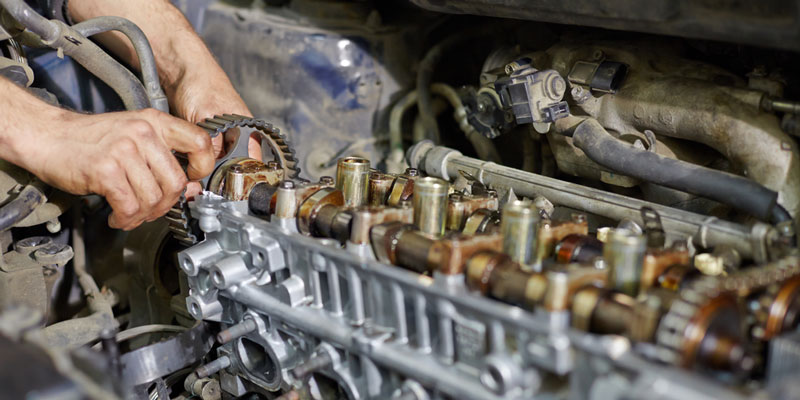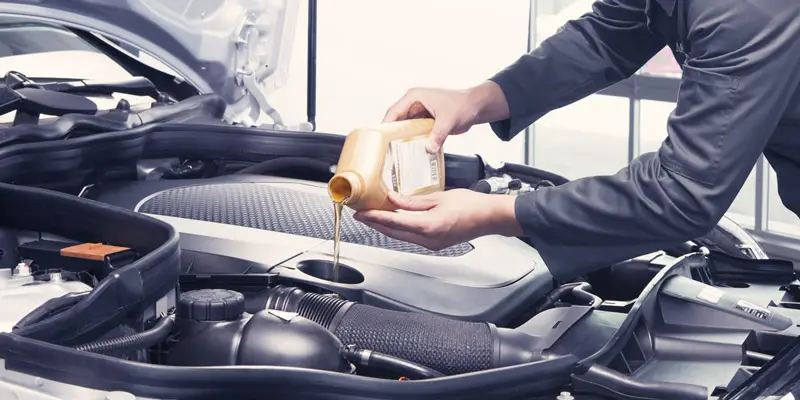If your car’s engine starts making a ticking noise that drives you nuts, it signals a couple of engine-related problems that could become severe if not addressed. Thus, you might wonder, will thicker oil stop lifter noise?

Switching to a thicker oil won’t diminish the noise of the lifers. Quite frankly, you are more likely to experience the opposite results ㅡ why? Thicker oil travels to the top of the engine slower, resulting in a louder ticking or tapping noise from the lifter.
However, the noise tends to disappear as the engine and oil get heated up. But this option only means you are avoiding the root of the problem. Hence, it’s best to figure out why your engine is making a noise and fix it.
Thus, in this guide, we’ll be discussing the causes of lifter noise, how to fix this nut-driving noise, and the right time to change your engine’s oil.
Why Your Engine is Making a Noise
When you hear the ticking noise from your engine, it’s probably one of these three reasons. To identify and solve this problem, here are a couple of things you should check:

Valve Lifters Adjustment
Usually, when the lifter makes noise, it’s because they are out of adjustment. Valve lifters are not created the same; they differ in size and are specifically designed for a particular type of car engine. You can’t just replace your car’s lifter with anyone that comes your way.
The valve lifters need to be fitted or adequately adjusted to ensure it doesn’t bump into your car’s camshaft. When you start your vehicle and hear that ticking sound, it’s because the valve is vibrating against the camshaft.
With this information, will thicker oil stop lifter noise? NO. It would be best to get the valve lifters adjusted to prevent the vibration from causing the ticking noise.
The Engine Is Not Well Lubricated
Engines have lots of moving parts, which necessitate lubrication. So, if the engine’s upper cylinder head lacks lubrication, you can imagine how much noise and the kind of sound it’ll produce ㅡ loud knocking sound.
In this case, will thicker oil stop lifter noise? It is more likely to help lubricate your engine for swift and whisper-quiet operation.
Bent Push Rod
You tend to push the gas pedal more often for sports cars, causing the pushrod to bend. While the pushrod will bend over time, how often you push time depends on when this problem happens. If you drive a sports car, you will likely have this issue sooner than later.
So, when you start hearing noise from your engine, don’t ask, will thicker oil stop lifter noise? Go and fix the bent pushrod.
How To Fix Noisy Valve Lifters
Now that you are aware of the leading causes of a ticking or knocking sound from your engine; here are some of the best ways to diminish the noise and protect your engine:

Use Engine Oil System Cleaners
One of the best ways to deal with this noise problem is to replace your engine oil. This method offers two benefits ㅡ improved fuel economy and quiet engine operation.
Here are simple steps you can follow to change your engine oil:
- Open the hood
- Remove the fill cap for the oil compartment
- Fill it with the engine oil system cleaner
- Replace the cap
- Drive the car for a day at average speeds
Pro Tips: you must replace the engine oil to cut fuel costs and guarantee better gas mileage. So, it’s advisable to maintain consistent optimal oil levels.
Replace Bent Push Rods
If your engine makes a ticking sound, adding the thickest lubricants might not solve this problem. You should check the pushrod; if it’s bent, replace it.
In this case, purchase new pushrods. They are affordable and easy to replace. Here are the steps to check your push rod’s status:
- Unscrew the push arm
- Lift the pushrods
- Take out the pushrods
- Roll each of them on flat terrain or surface
- Any pushrods that wobbles are bad
- Replace the bad ones with the new ones
- Screw the push arm after placing all of the pushrods back in
Pro Tip: when next you want to push the gas pedal of your sports car, take it easy to avoid bending the pushrods quickly.
Rod Knock Noise? Use Heavy Oil
When it comes to annoying noises from a car engine, you don’t want to ignore rod knock noise. This could mean the days of your vehicle are numbered.
If you want quick aid with this problem, you should go for heavy motor oil. Keep in mind that this does not solve the problem but dampens the noise. It’s only a first aid to prevent your car from being a nuisance.
Also, you want to remember that rich oil has thicker oil viscosity making your engine heat up faster since it’ll struggle to pump the oil compared to conventional oil through the engine. Nonetheless, you should stick with the type of oil that’s compatible with your lifter according to your vehicle’s manual.
Pro Tip: it’s paramount that you warm the car engine before driving it to ensure that the heavier or thicker oil is pumped through the engine. Otherwise, you might damage the engine since it’ll lack oil for proper engine lubrication.
Adjust The Valve Lifters
There are two types of valve lifters – manual and hydraulic valve lifters. The latter does not require adjustment since doing that automatically. On the flip, manual lifters need constant maintenance and replacement to ensure the right lifter spacing.
If you hear a ticking sound from your engine, it’s likely the spacing of the valve lifters is wrong, poorly fitted, or worn out. Adjusting the lifter might sound easier, but it’s not. While it’s possible to do it yourself, we recommend calling or taking your vehicle to your mechanic.
This process involves taking out more of the engine’s parts like the valve train, valve cover, rocker arm, and not more. Does it sound like something you want to do on the weekend? If not, then allow a professional mechanic to do it for you. Also, it’s important that you get the right size of the valve lifter as recommended by your car manual.
Purchasing A New Set Of Lifters
If, after trying most of our solutions discussed in this section, you still have to deal with the annoying ticking noise, then this is the last resort ㅡ getting a new set of lifters. We advise that you purchase a complete lifter set instead of opting to buy it per piece. This should solve the noise problem from your engine. But that’s up to you and your mechanic.
When To Change Your Car Engine Oil
It’s vital to lubricate your engine for better well-being. Clean, quality oil ensures a longer engine life and overall improved performance. Changing your engine’s oil is a quick and hassle-free process, especially if you know what you’re doing.

Here are some of the signs to signal an oil change:
- Check the oil change light
- Knocking noise from your engine
- The interior of your car smells oily
- The oil has gone dark and dirty
- Exhaust smoke
- After driving for three months or 3,000 miles
Conclusion
Hearing a ticking noise from your engine can drive you nuts, and one of the first ideas/questions/solutions that pops into anyone’s mind is using a thicker. You’re not wrong to follow this route, but this won’t work in all cases. Noise from the engine can be due to bent pushrods or valve lifters being out of adjustment.
Therefore, it’s important to understand the root cause and fix it appropriately. Keep in mind that ignoring this issue can lead to engine failure ㅡ, so why not fix the lifter noise now?
